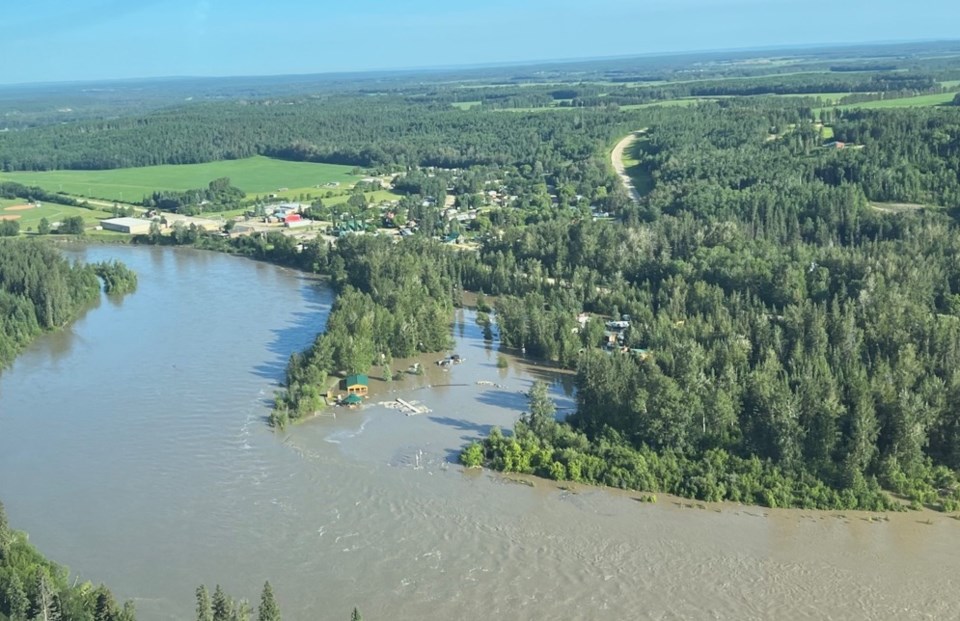FORT ASSINIBOINE — After an hour-long debate over how to provide support to an estimated 329 properties affected by recent flooding, Woodlands County councillors passed three motions at their July 19 meeting relating to tax penalties, landfill access and an existing disaster grant program.
First, council passed a motion to waive the 2023 tax penalties for 49 property-owners who have not yet settled their tax bills. Normally, six per cent penalties would be applied to tax bills at the end of June and August.
Second, council passed a motion to have administration bring back to their Aug. 16 meeting a revised relief assistance for catastrophic events policy, which will now take into account residents affected by flooding.
Finally, council passed a motion to extend free access to the Whitecourt Regional Landfill for flood-affected residents until Sept. 5, 2023.
Coun. Alan Deane excused himself from the discussion and all three votes due to a pecuniary interest.
Tax penalties waived
Director of corporate services Victoria Chan noted that council had directed administration at the June 19 special council meeting to determine how many property-owners had been affected by the recent flooding, and to propose a measure for extending financial relief.
Based on maps showing high water impact, administration determined that 53 properties in Division 2 (Whitecourt West), 237 properties in Division 3 (Whitecourt Central) and 39 properties near Fort Assiniboine would have been affected.
Of those 329 properties, only 49 had outstanding tax bills equaling a total of $68,259.62.
Administration’s initial recommendation would be to waive the six per cent penalty that would be applied to unpaid tax bills up to Aug. 31, 2023.
Chan acknowledged that council had directed administration to investigate the possibility of temporarily refunding taxes to affected residents, but she warned that would pose some ‘technical difficulties.”
For starters, she pointed out that in some cases, property taxes are paid on a property-owner's behalf by the bank as part of a pre-existing arrangement. If a tax account was later left outstanding, that would raise a question of whether the resident or the bank is liable.
Chan warned there could also be issues related to property-owners not cashing their cheques, as well as those residents on monthly deferral payment programs.
She indicated that her recommendation would be easier to implement than a temporary refund and would only cost the county about $4,095.
Coun. John Burrows, who represents Division 2, pushed for council to instead consider some kind of an application process wherein affected residents could request a refund of their taxes.
Burrows said he’d had conversations with some residents who are “hanging by a thread” following two years of the pandemic and the recent flooding, and he believed that temporarily refunding them their taxes would be the best way to help.
“I’m trying to get people some breathing room here. I’ve had some really rough conversations,” he said.
Coun. Bruce Prestidge pointed out that the county has an existing policy where residents who experience a catastrophic event and the loss of their home and/or nearly all their personal belongings can receive a $1,000 grant and asked why it couldn’t be made available to flood-affected residents.
One problem noted by Chan was that if they gave $1,000 to every flood-affected resident, that would cost the county approximately $329,000.
As well, it was also pointed out that affected residents did not generally experience the “catastrophic” loss of their home and personal possessions.
Noting that this was the second major flooding event experienced by Woodlands County in the seven years he had been on council, Burrows suggested that they should have a standing policy to provide relief to property-owners affected by such events.
“We should probably have something in our pocket that deals with this for a little bit of relief,” he said.
Coun. Peter Kuelken, who represents Fort Assiniboine, said the county should also put aside a reserve fund for disaster relief, noting that the county “dodged a bullet this year” with the flooding that occurred.
“I think this opens up a completely new responsibility for our councils,” he said.
Ultimately, this led to the motion to bring back a revised relief for catastrophic events policy to the Aug. 16 council meeting.
Landfill access
During a special council meeting on June 29, councillors had previously passed a motion waiving tipping fees at the Whitecourt Regional Landfill on July 10 to allow flood-affected property-owners to dispose of debris.
Council also directed that six refuse containers be placed around the county for property-owners to dump debris in.
Director of infrastructure Andre Bachand said those measures had been well-received, but the county had received a number of calls from property-owners asking for extra time, as they were still finding debris on the farthest reaches of their properties.
As such, administration recommended that council extend the free landfill access until Sept. 5, noting that they would send out letters to affected property-owners.



